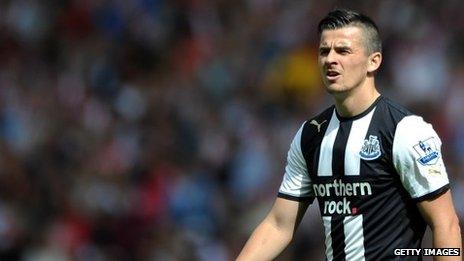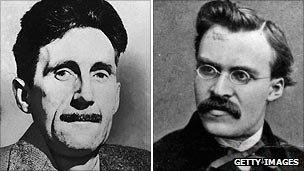Joey Barton: What's behind his Twitter philosophy?
- Published
- comments

Footballer Joey Barton is a convicted criminal who's reinvented himself on Twitter. But do his tweets reveal him as a budding philosopher?
For many Joey Barton is beyond the pale. A footballer with a history of violence, who stubbed out a lit cigar in the eye of a teammate and was jailed for punching someone 20 times while on a night out.
But for others the Newcastle United player has not only mellowed, he has reinvented himself on Twitter as a philosophical sportsman to rival Eric Cantona in his heyday.
At the last count @Joey7Barton had more than 450,000 followers. It's less than half the total of England striker Wayne Rooney, but Barton tweets on subjects far beyond the banal concerns of the usual modern footballer.
He has debated the ideological underpinnings of the Big Society, revealed a fondness for the lyrics of the Smiths, expressed an admiration for the engineer Isambard Kingdom Brunel, and shared aphorisms by Virgil, Seneca and Nietzsche.
GQ magazine noted approvingly that he had used "echelons" and "persona non grata" in the same 140 characters.

George Orwell and Friedrich Nietzsche are among Barton's influences
Recently, he has added impetus to the petition to force the government to release official papers on the Hillsborough disaster, encouraging numerous celebrities to sign and retweet it.
His tweet in reaction to the riots - "Violence always comes from a place of misunderstanding and low to zero self-worth, well mine did anyway" - was much highlighted by the media.
For some, Barton's utterances suggest he has changed from the person who punched team-mate Ousmane Dabo into a person who has realised that he has problems and needs to solve them. At a time when people - in the wake of the riots - are considering whether and how miscreants can be reformed, Barton is an intriguing example.
Others still need to be convinced that Barton is a reformed character, contrasting his apparent thoughtfulness on Twitter with the fact he has been involved in scuffles in both the league matches he has played this season.
Daily Telegraph football correspondent Henry Winter first bumped into Barton on Twitter when rumours began circulating that he was leaving Newcastle United.
"It was at the time when Joey was lobbing George Orwell quotes around. So I wished him good luck on the road to Wigan Pier."
While Barton appreciated the Orwell reference, not everyone was in on the joke. A handful of Newcastle fans tweeted the player asking why he was signing for Wigan Athletic.
Some may find it hard to forgive Barton for his past behaviour. But his Twitter philosophising is to be welcomed, Winter believes. "Even if you don't agree with everything he says, he's a bright guy trying to deal with his demons."
He has an addictive personality, and it's far better that he "pours himself into Twitter" than goes out drinking, Winter suggests.
In 1995 Cantona bewildered and amused people in equal parts when he turned up at a press conference to explain his kung-fu attack on a spectator. He uttered just a single sentence: "When the seagulls follow the trawler, it is because they think sardines will be thrown into the sea."
For Tim Adams, author of On Being John McEnroe, Barton is bringing the same level of surrealness back to football. "The Premier League has lacked a philosopher king since Cantona gave his gnomic farewells. I love the way Barton's box-to-box wisdom veers so swiftly between OMG textspeak and canonical thoughts from the great Western tradition."
Auditioning as England's newest public intellectual appears a surprising move at first glance. This is the man whom a judge once described as "violent and cowardly". But after his spell in prison he attended the Sporting Chance clinic and vowed to give up drinking.
The clinic was set up by the ex-footballer Tony Adams, who dealt with alcoholism by taking up the piano and reading the novels of Thomas Hardy. Barton is on a similar journey of self conscious reinvention.
"You can hear the authentic self-help rhetoric of Sporting Chance in everything Barton tweets - that heady mix of T-shirt philosophy and 12-step programme," Tim Adams says.
It's easy to mock, says Simon Kuper, the Financial Times columnist and author of The Football Men. But Barton should be applauded for going against the anti-intellectual grain of English football culture, he argues.
Barton may have 10 GCSEs but English footballers - unlike their Scottish, Dutch and German counterparts - have any aspirations of learning knocked out of them once they arrive at their clubs, Kuper argues.
In effect Barton is an autodidact, educating himself. And if he gets the odd thing wrong, so what, says Kuper. "It's inspiring he wants to share his learning. Many of us did that in the uni bar, confidently expressing things we may not have completely understood. He is doing the same to many more followers on Twitter."
The pundit and former Scotland international Pat Nevin agrees there is often little room for intellectual debate in the macho dressing room atmosphere. As a Chelsea player he would try and drag teammates to London's South Bank for cultural events.
He was rewarded with the nickname "weirdo" by puzzled teammates.
He's sympathetic to any footballer's desire to widen their intellectual horizons. But the "kerfuffle" over Barton's newfound erudition leaves him cold. "Is he simply lifting the quotes or does he have a good understanding of philosophers and engineers?"
Nevin believes Barton will have no shortage of job offers when he hangs up his boots. "The way the media is going, Joey Barton is A1 what media companies are looking for. Robbie Savage is quite similar and absolutely catches the zeitgeist. I suspect Joey will too."